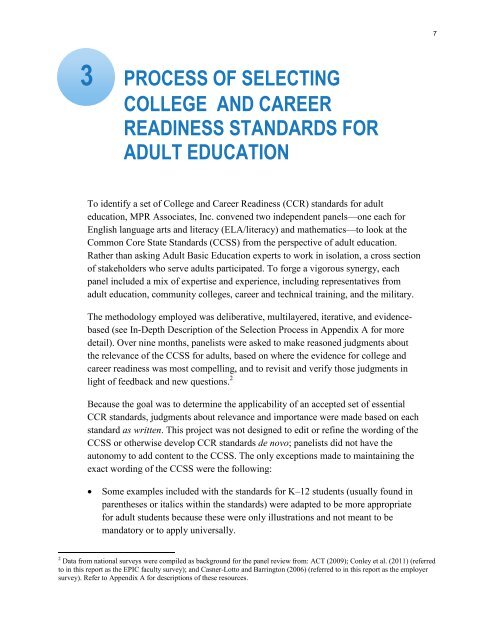CCRStandardsAdultEd
Create successful ePaper yourself
Turn your PDF publications into a flip-book with our unique Google optimized e-Paper software.
7<br />
3 PROCESS OF SELECTING<br />
COLLEGE AND CAREER<br />
READINESS STANDARDS FOR<br />
ADULT EDUCATION<br />
To identify a set of College and Career Readiness (CCR) standards for adult<br />
education, MPR Associates, Inc. convened two independent panels—one each for<br />
English language arts and literacy (ELA/literacy) and mathematics—to look at the<br />
Common Core State Standards (CCSS) from the perspective of adult education.<br />
Rather than asking Adult Basic Education experts to work in isolation, a cross section<br />
of stakeholders who serve adults participated. To forge a vigorous synergy, each<br />
panel included a mix of expertise and experience, including representatives from<br />
adult education, community colleges, career and technical training, and the military.<br />
The methodology employed was deliberative, multilayered, iterative, and evidencebased<br />
(see In-Depth Description of the Selection Process in Appendix A for more<br />
detail). Over nine months, panelists were asked to make reasoned judgments about<br />
the relevance of the CCSS for adults, based on where the evidence for college and<br />
career readiness was most compelling, and to revisit and verify those judgments in<br />
light of feedback and new questions. 2<br />
Because the goal was to determine the applicability of an accepted set of essential<br />
CCR standards, judgments about relevance and importance were made based on each<br />
standard as written. This project was not designed to edit or refine the wording of the<br />
CCSS or otherwise develop CCR standards de novo; panelists did not have the<br />
autonomy to add content to the CCSS. The only exceptions made to maintaining the<br />
exact wording of the CCSS were the following:<br />
• Some examples included with the standards for K–12 students (usually found in<br />
parentheses or italics within the standards) were adapted to be more appropriate<br />
for adult students because these were only illustrations and not meant to be<br />
mandatory or to apply universally.<br />
2 Data from national surveys were compiled as background for the panel review from: ACT (2009); Conley et al. (2011) (referred<br />
to in this report as the EPIC faculty survey); and Casner-Lotto and Barrington (2006) (referred to in this report as the employer<br />
survey). Refer to Appendix A for descriptions of these resources.


